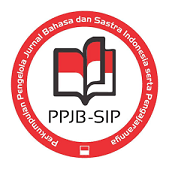PENGGUNAAN E-LEARNING DALAM PEMBELAJARAN BAHASA INDONESIA DI SMA NEGERI BALI MANDARA
DOI:
https://doi.org/10.23887/jjpbs.v7i2.14980Abstract
Penelitian ini bertujuan untuk mendeskripsikan (1) isi dan daya dukung e-learning dalam pembelajaran bahasa Indonesia di SMA Negeri Bali Mandara, (2) penerapan e-learning dalam pembelajaran bahasa Indonesia di SMA Negeri Bali Mandara, dan (3) respons peserta didik terhadap penggunaan e-learning dalam pembelajaran bahasa Indonesia. Penelitian ini menggunakan rancangan penelitian deskriptif kualitatif-kuantitatif. Subjek penelitian ini adalah guru mata pelajaran bahasa Indonesia dan peserta didik kelas XI IPA I dan IPA II SMA Negeri Bali Mandara. Objek penelitian ini adalah penggunaan e-learning dalam pembelajaran bahasa Indonesia. Data dalam penelitian ini dikumpulkan melalui metode observasi, wawancara, dokumentasi, dan kuesioner (angket).Temuan dalam penelitian ini adalah (1) isi e-learning dalam pembelajaran bahasa Indonesia,ada lima yaitu: (a) kode kelas, (b) materi bahasa Indonesia,(c) materi tambahan (d) tugas online, dan (e) hasil asessment. Sementara daya dukung e-learning dalam pembelajaran bahasa Indonesia di SMA Negeri Bali Mandara ada tiga, yaitu: (a) mempermudah guru dalam mengajar, (b) mendukung materi dalam silabus, (c) memfasilitasi evaluasi online. (2) Penerapan e-learning dalam pembelajaran bahasa Indonesia di SMA Negeri Bali Mandara dapat dibagi menjadi dua, yaitu (a) dalam bentuk flip learning, dan (b) dalam bentuk full e-learning. (3) Respons peserta didik terhadap penggunaan e-learning dalam pembelajaran bahasa Indonesia, yaitu sangat positif (31,45%) dengan rincian terdapat 21 (47,72%) memberikan resposn sangat setuju dan 23 (52,27%) memberikan respons setuju.Kata Kunci : Penggunaan e-learning, isi, dan daya dukung e-learning, dan respons peserta didik
This research intended to describe (1) the content and supportability of e-learning in Indonesian language learning in SMA Negeri Bali Mandara, (2) the application of e-learning in Indonesian language learning in SMA Negeri Bali Mandara, and (3) the response of thestudents due to the application of e-learning in Indonesian language learning. This research used descriptive qualitative-quantitative as the research design. The subjects of this study were Indonesian language teachers and the students of class XI IPA I and IPA II of SMA Negeri Bali Mandara. The object of this research was the application of e-learning in Indonesian language learning. The data in this research were collected through observation method, interview, documentation, and questionnaire. The findings of this research were (1) the content of e-learning in Indonesian language learning there are five, those were: (a) class code, (b) Indonesian language material, (c) additional material (d) online task, and (e) assessment results. Meanwhilethe supportability of e-learning in Indonesian language learningin SMA Negeri Bali Mandara there are three, those were: (a) facilitate the teachers in teaching, (b) support the material in the syllabus, (c) facilitate the online evaluation. (2) The application of e-learning in Indonesian language learning in SMA Negeri Bali Mandara could be divided into two, those were: (a) in the form of flip learning, and (b) in the form of full e-learning. (3) The response of students due to the application of e-learning in Indonesian language learning, that was very positive (31.45%) with details there were 21 (47,72%) gave response strongly agree and 23 (52,27%) gave response agree .
keyword : Application of e-learning, content and supportability of e-learning, and student's response
Published
2018-07-25
Issue
Section
Articles
License
Authors who publish with the Jurnal Pendidikan Bahasa dan Sastra Indonesia Undiksha agree to the following terms:- Authors retain copyright and grant the journal the right of first publication with the work simultaneously licensed under a Creative Commons Attribution License (CC BY-SA 4.0) that allows others to share the work with an acknowledgment of the work's authorship and initial publication in this journal
- Authors are able to enter into separate, additional contractual arrangements for the non-exclusive distribution of the journal's published version of the work (e.g., post it to an institutional repository or publish it in a book), with an acknowledgment of its initial publication in this journal.
- Authors are permitted and encouraged to post their work online (e.g., in institutional repositories or on their website) prior to and during the submission process, as it can lead to productive exchanges, as well as earlier and greater citation of published work. (See The Effect of Open Access)







